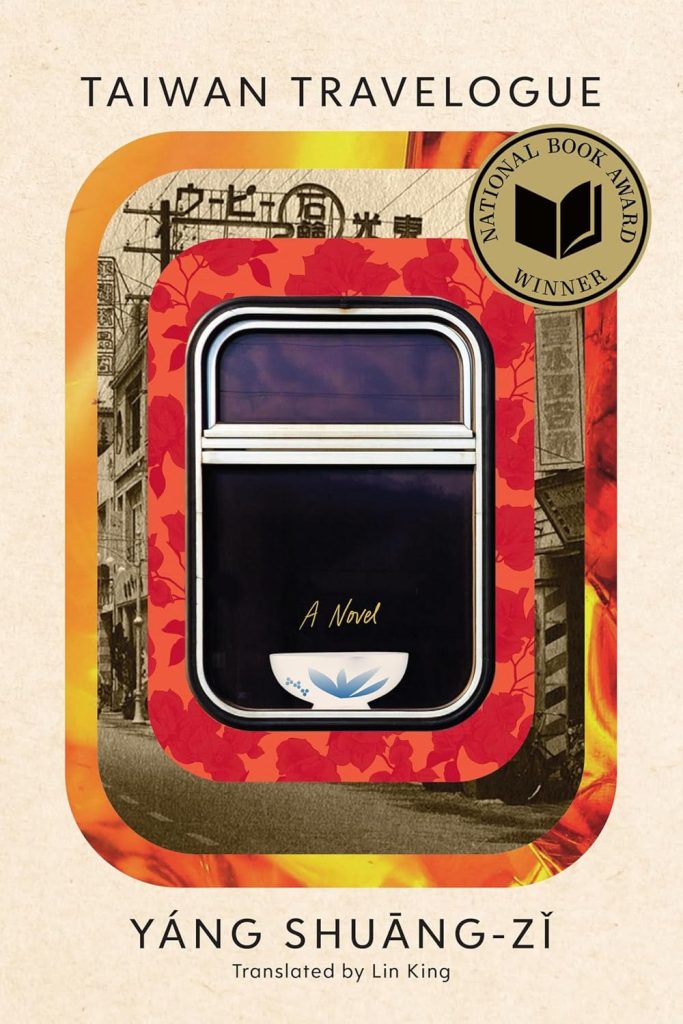Literature from Taiwan has been on the upswing internationally for several years now, forming an important avenue through which to showcase Taiwan’s rich cultural identity, and there is no better example of this than the 2024 winner of the American National Book Awards in Translation: Taiwan Travelogue, by Yang Shuang-zi (楊双子).
Yang Shuang-zi, which literally means “twins” is the pen name of novelist and manga artist Yang Ruoci (楊若慈), and her sister, Yang Ruohui (楊若暉), though Yang Ruoci has adopted it for herself since her sister’s passing.
Taiwan Travelogue (臺灣漫遊錄) was originally published in 2020. Its translation by Lin King (金翎), published by Graywolf Press, won the 2024 National Book Awards in Translation, the first work from Taiwan to do so.
Though written in Mandarin, it presents itself as the Mandarin translation of a rediscovered Japanese novel, a travelogue of a Japanese writer running from an arranged marriage. The relationship the protagonist builds with her Taiwanese guide as they travel the island experiencing local food culture reflects the ethnic, class, and identity conflicts between and within the colonizer and colonized. Its focus on food culture and gender makes it interesting and accessible to a wide audience, in Taiwan and abroad.
In a later interview with Commonwealth Magazine, she said that she sees herself as a lever by which Taiwan literature can open itself to the world, and the visible tip of the Taiwan literature movement itself. Hence, when making her acceptance speech at the awards ceremony, she spoke not for herself, but for Taiwan literature and Taiwanese as a whole: “Why [do I] write about things that happened a hundred years ago? My answer is always that because writing about the past takes us towards the future…Taiwanese opinions on national and ethnic identities have changed…I write in order to answer the question, what is a Taiwanese person?”
This is not the first time her work has been translated; the Japanese edition of Taiwan Travelogue had already won the Best Japanese Translation Award in May of 2024. The Story of Fantasy Flower (綺譚花物語), another novel about female friendship set in the Japanese colonial era and published in 2020, was adapted into a manga by artist Monday Recover, and also translated into Japanese in 2022.
Taiwan literature has also been making inroads in German. Von Berglern und Geheimagenten –Zeitgenössische Erzählungen aus Taiwan (Of Mountain Men and Secret Agents – Contemporary Tales from Taiwan), the German edition of 《原住民與奸細——當代臺灣短篇小說選集》, translated by Hsu An-Nie (徐安妮), was released last year as well. The book consists of a compilation of twelve stories, each by a different author (including three Indigenous writers). The common thread uniting the stories is identity and identity politics. The title itself is a reference to this: the “mountain men” (Indigenous or other marginalized groups) become “secret agents,” disguising themselves to fit into the dominant group in society.
This volume follows on the footsteps of the first Taiwanese story compilation published by Projekt-Verlag, Erzählband Von Wahrsagern und Technofrauen (Of Fortune Tellers and Techno-women).
The Czech market, as well, is now no stranger to literature from Taiwan. Similar to the above tomes in German, Výbor moderní tchajwanské prózy /2 is the Czech translation of 《穿別人的皮膚:現代臺灣文學選集2》(In Someone Else’s Skin: Selections of Modern Taiwan Literature 2). This 2024 volume by Mi: Lù Publishing features works by ten notable authors, including Kaori Lai (賴香吟), Wu Ming-yi (吳明益), Egoyan Zheng (伊格言), Pai Hsien-Yung (白先勇), and Chen Xue (陳雪), dating from between 1937 and 1977, touching on themes of identity, self-awareness, and trauma, and how they change under the pressures of political, social, and cultural upheaval. It was published in parallel with the Czech edition of Chi Ta-wei’s (紀大偉) Membrány (《膜》, The Membranes). Chi Ta-wei is best known for his attention and contributions to LGBTQ+ literature in Taiwan; The Membranes depicts a cyberpunk future where humanity has been forced to migrate to the ocean floor after an environmental catastrophe, and has already been widely translated into other European languages.
Translation and overseas publishing of Taiwan literature has proven itself to be one of the more effective means of cultural outreach, allowing writers in Taiwanese languages to demonstrate Taiwan’s diversity and uniqueness through a wide variety of genres. Its recent growth is a sign that readers around the world are recognizing the significance of Taiwan’s cultures.
